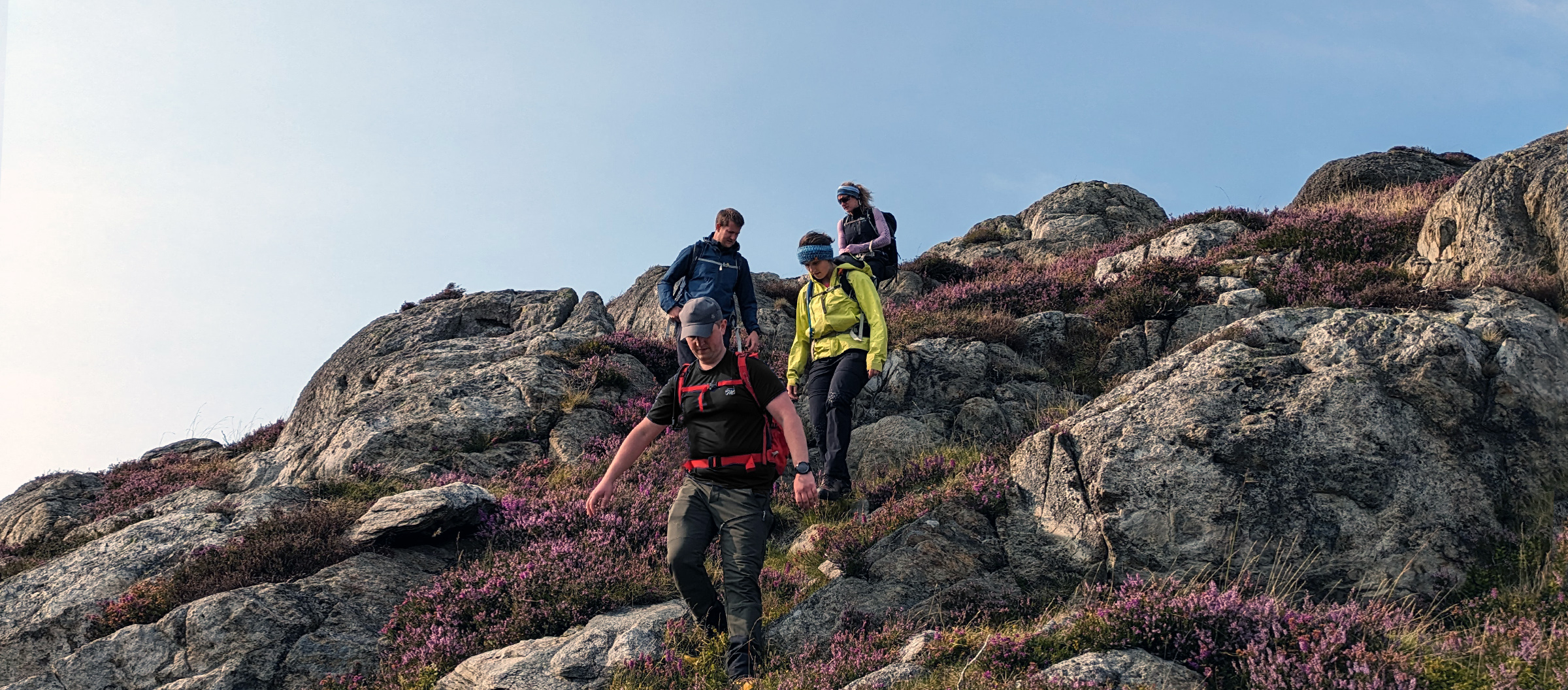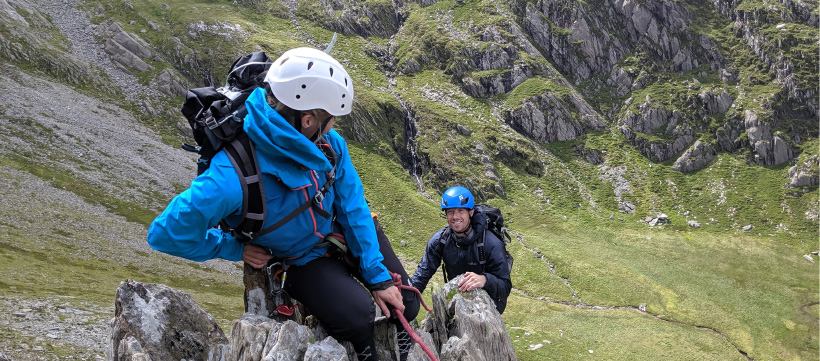Overview
The Hill Walking Skills course is your key to getting started in the world of hill walking in countryside and moorland! No previous experience of hill walking is required to attend the course because the content of the course is aimed at complete beginners and those just starting out. Our main priority is getting you hiking and ensuring you come away with solid skills that will set you up for a lifetime of enjoying the outdoors. Whilst we’ll cover some background information like planning, equipment, weather, hazards etc through the course the focus will be to get as much out on the hills as possible soaking up the views!
Course Aims
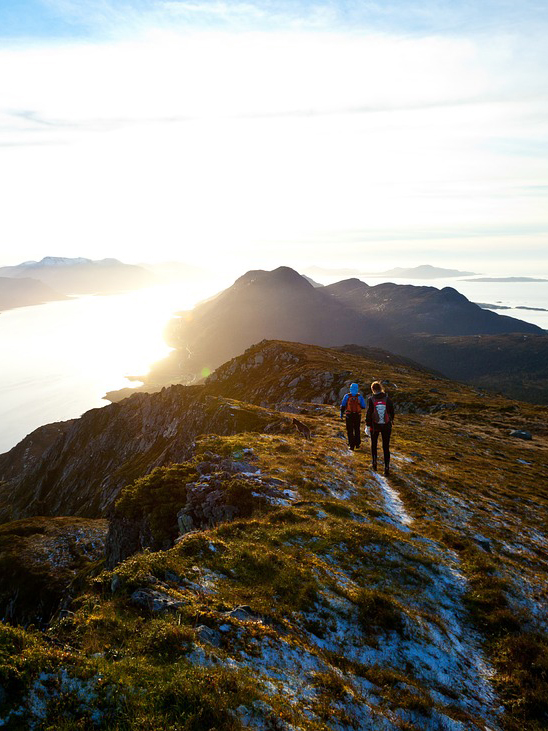
By the end of this course you’ll have;
- A couple of enjoyable days out walking in the hills
- Have the skills to start going hill walking for yourself
- Be ready to attend the Mountain Skills course
Syllabus
Below is a rough idea of what we’ll cover, as ever we’re flexible and adapt to different needs and experiences.
- Planning – how to successfully plan a hill walk in the UK or Ireland.
- Walking skills – what things should you consider while out walking and what can make life easier (pace, nutrition, movement skills etc.).
- Clothing and equipment – being suitably dressed and equipped can make the difference between a great day out and a complete disaster.
- Weather – how it affects the hills and your day out.
- Navigation in the hills – everything from selecting a compass to navigation strategies and an intro to GPS.
- Environmental knowledge – how to minimise your impact on the hill and information on good practice and useful organisations.
- Hazards and emergency procedures in the hills – how to respond to any hazards you encounter and what to do in an emergency.
Prerequisites
Being an introduction course there are no prerequisites, all you need is an interest in hiking! If you’ve done a little hill walking beforehand you’ll still be in a good position to benefit from this course. The Hill Skills course requires only a moderate level of fitness. It is a practical course where we’ll be walking for a good part of each day, and learning along the way. The main thing you’ll need is enthusiasm!
Where do we walk on a Hill Skills Course?
The keen eyed will notice that we’re based in Llanberis, Snowdonia and surrounded by mountains; we are very fortunate to have some lovely gentler hills nearby – Moel Elio is literally on our doorstep. A short drive away the Northern slopes of the Carneddau range offer some beautiful smaller hills away from the crowds where you might encounter the Carneddau ponies. If the weather in the mountains isn’t playing ball there’s also the option to drive to the coast to put the skills into practice on a coastal walk.
Gallery
Course Details
The course programme is flexible to allow for weather conditions on the day and varying group experience but below is a sample itinerary of what we'd typically cover on this course.
Day 1

08:00 (Optional)
Morning tea and coffee available from 08:00 at Basecamp Coffi
08:30
Move to Advanced Basecamp private briefing room
Welcome and introductions
Hill Skills Course Outline
Weather Brief
Route planning intro
Equipment
09:30
Hill Walking!
Navigation Intro
12:30
Lunch on the Hill
13:00
Environmental Knowledge
Bag some summits
16:30
Return to Basecamp
Tea, coffee and cake
Day 2
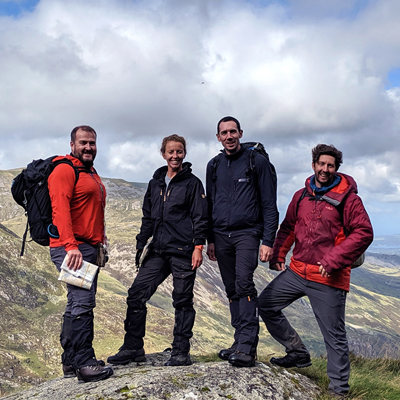
08:00 (Optional)
Morning tea and coffee available from 08:00 at Basecamp Coffi
08:30
Move to Advanced Basecamp private briefing room
Weather Brief
Route planning - over to you to make the decisions!
09:30
Hill Walking!
More Navigation
12:30
Lunch on the Hill
13:00
More Environmental Knowledge
Emergency Procedures
15:30
Return to Basecamp
Tea, coffee and cake
Next Steps - inspiration and information
Course finish
Kit List – Hill Skills
 We appreciate that this is an intro course and getting fully kitted out can be expensive. We want you to have the right kit so you can enjoy your time on the course safely. We’ve ordered the list in terms of most importance, so it gives you an idea of where to spend your money and where savings can be made.
We appreciate that this is an intro course and getting fully kitted out can be expensive. We want you to have the right kit so you can enjoy your time on the course safely. We’ve ordered the list in terms of most importance, so it gives you an idea of where to spend your money and where savings can be made.
Not all of the kit will be carried all the time, for example sun protection but it’s worth having kit to select from for the range of conditions the British Hills can throw at us.
If you want any advice on kit, whether you’re unsure of current kit’s suitability, if you’re looking to get some new kit, or if you’re struggling to get certain bits get in touch and we’ll try our best to help out. At the end of this kit list are some shop recommendations for great shops.
Mobile Phone – please bring a mobile phone for emergencies. It’s worth thinking how to waterproof this in case of wet weather!
Walking Boots – I’d really recommend a pair of well fitted hiking boots with an ankle cuff for good support. A decent slightly stiff sole (Vibram soles are great) and waterproof are the main qualities to look for. Make sure they fit well at home and break them in on some gentle walks so they’re comfy before attending the course.
Walking Socks – these are generally a little more padded than regular socks, with a high cuff to match boots and a technical wicking material to help your feet stay dry. Match them to your boots when fitting!
Waterproof Jacket and Bottoms – these should be “Hard Shell”, as opposed to “Soft Shell” material which is only water resistant! Gore-tex and Event come recommended. Size large enough to fit over all your other layers. Pay attention to the hood, can it be cinched down securely for windy days? Size zips on waterproof trousers so they can easily be on without removing your boots!
Rucksack – large enough to carry kit for the day. A good day bag size is about 20 – 30 litres. We really like Lowe Alpine packs.
Rucksack Waterproofing – most rucksacks aren’t waterproof. Some come with raincovers which we don’t rate highly. The best system we’ve found are rolltop drysacks of varying sizes to help organise your kit. If you want to save cash burly shopping bags will do the trick.
Walking Trousers – no jeans or cotton! Synthetic man made fibres are best, any modern quick drying fabric. Not too warm as your legs are often working hard, waterproof trousers can always be layered over the top.
Walking Tops – again, no cotton. Materials that will wick away moisture effectively, synthetic or merino wool are popular. A thin baselayer next to the skin.
Midlayer – again, no cotton. Fleece is ideal and pretty cheap these days. At a pinch a wooly jumper will do the trick.
Warm Top – no cotton! A warmer layer you can put on for breaks or really cold days. If you can afford it we’re a big fan of synthetic “Belay Jackets” filled with primaloft or similar. A thick fleece would be fine though.
Headtorch – we won’t plan on being out after dark but this is an essential piece of personal kit to head out in to the hills with. A head torch as opposed to hand torch is highly recommended. There are loads of cheap LED head torches to choose from these days that are great – check out the Alpkit range for a bargain. Buying a model with a USB rechargeable battery is great to save on batteries and for when travelling/longer journeys.
Personal First Aid Kit – your instructor will carry a group first aid kit but it’s worth carrying a few basics of your own. It doesn’t need to be a dedicated kit, just useful bits – a small roll of thick zinc oxide tape to use as plasters/fix things, steristrips, a small triangular bandage, a few alcohol wipes, tick remover tool, gloves. Don’t forget to put any personal medication in and waterproof it!
Hat – wooly or fleecy warm hat for chilly days.
Sun Hat – this can be crucial; don’t underestimate how strong the sun can be in the UK mountains!
Sun Screen – essential SPF 30+; don’t underestimate how strong the sun can be in the UK mountains!
Sunglasses – not essential with a sun hat but important to look cool!
Water Bottle – ultimately anything light and secure will do. Nalgene bottles are BPA free, durable and light.
Food – anything light, tasty and full of energy that can survive being in a rucksack. Sandwiches are ubiquitous but salads or pasta are great too. Plenty of “on the go” snacks to perk you up, jelly babies, chocolate, nuts, flapjack etc Shopping can be done in Llanberis at the Spar which has basics.
Optional Kit
Map – we can lend you a map for the course. We’ll most likely be working on the Ordnance Survey OL17 sheet. You’ll end up doing a lot of exploring in Snowdonia as it’s so great so you’ll get lots of use of it if you buy your own. Waterproof maps are worth considering as then you don’t need to worry so much about a map case.
Compass – we can lend you one but to start heading out for yourself you’ll need to invest in one at some point. We recommend the Silva Ranger or Expedition models. Cheap compasses are a false economy.
Flask – optional for cold weather days. Get a good leak proof one!
Insect Repellant – more of an issue at campsites as they’re worse first thing in the morning and at dusk
Walking Poles – I’m a big fan of these – they make a big difference and are a worthwhile investment in your knees, much cheaper than physio! My favorites are the Black Diamond z poles as they can fold up small enough to go inside a pack.
Gaiters – depending on how wet it is these can be really useful though we’ll try and avoid going anywhere too boggy!
Spare Clothes – if it does end up being quite a wet day on the hill a dry t shirt and top to change in to can be nice for when we get back to Basecamp!
If you’re buying new kit and able to swing by any of the following independent shops, they come highly reccomended with friendly staff, a good selection of kit and great specialist knowledge so try and support them if you can. If you’re buying a few items of kit don’t be scared to ask for a discount (most stores offer discount to BMC members, very worthwhile joining, mountaineering club members, students etc. as standard).
North Wales – V12 in Llanberis – 15% discount for Mountain Independence clients.
Lake District – Needlesports in Keswick, the Epicentre in Ambleside
Cairngorms – Cairngorm Mountain Sports in Aviemore
Peak District – Outside in Hathersage
What’s Included?
 Free morning tea and coffee at Basecamp Coffi
Free morning tea and coffee at Basecamp Coffi
Dedicated briefing room facilities
Fully qualified, current, Association of Mountaineering Instructors instructor, insured for all activities covered.
Post course resources to help your journey into the world of rock climbing.
What’s Not Included?
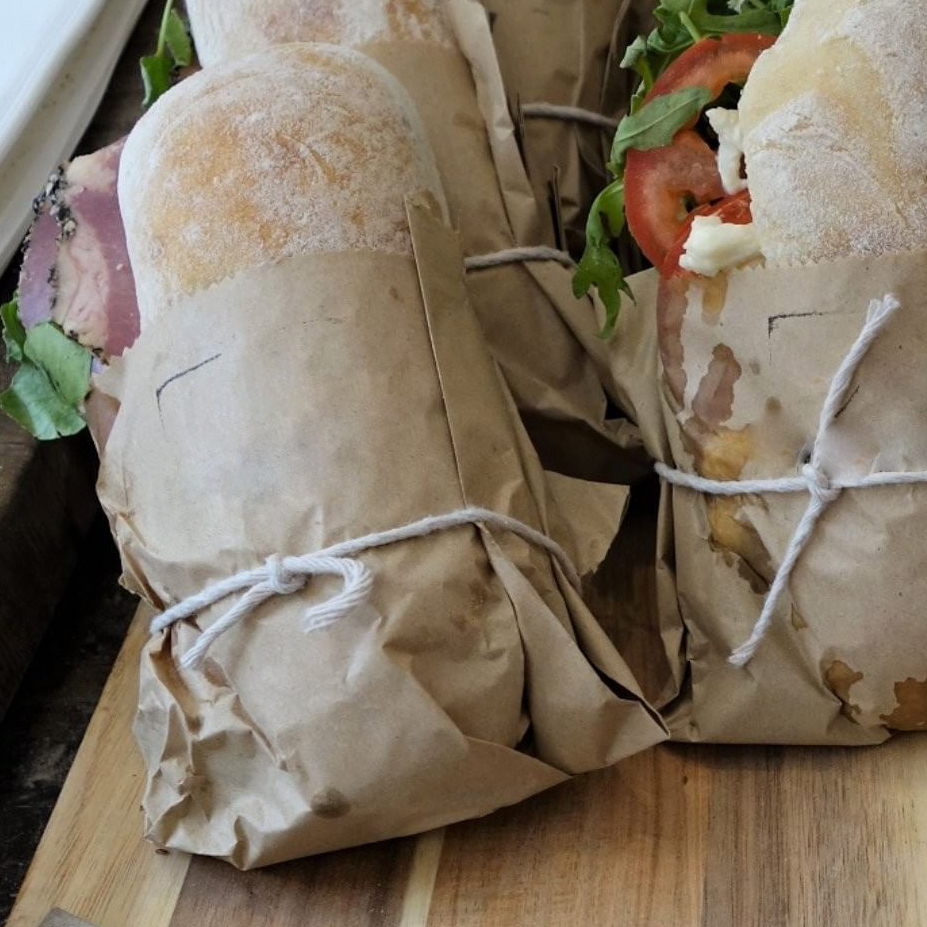
We don’t provide lunch, you’ll either need to bring your own or you can pick something up in Llanberis.
The course is non-residential so you can choose your own accommodation, from roll mat to hotel! Check out our accommodation guide for top tips on places to stay around Llanberis.
Transport is usually shared between those on the course and is not provided by Mountain Independence. Lift sharing helps the planet, eases parking congestion and provides travel companions to chat endlessly about the outdoors!
FAQs
General FAQs
For more generalised questions please visit our FAQs page or for questions specifically relating to the Mountain Skills course see below.
Mountain Skills FAQs
You can check our Booking Terms and Conditions here for booking and cancellations terms.
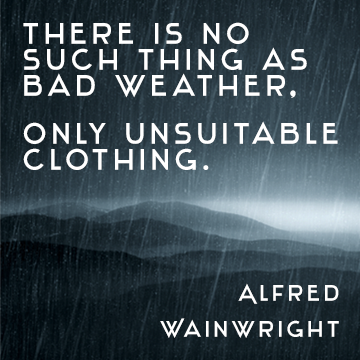
The British mountains are notorious for bad weather, and it's part and parcel of adventures in the mountains. It's important that clients are well prepared with the appropriate kit, which is why we provide detailed kit lists for all our courses. Our instructors will use their expert local knowledge to make the best of poor weather forecasts and get the most from your course.
If the weather is particularly poor we may travel a bit further afield, start earlier or later in the day to miss a weather band, head to an indoor climbing wall for climbing courses or shorten the exposure time outside by utilising our dedicated meeting space for theory sessions. It's very rare we ever have to cancel a day, but if the weather is so extreme as to present a serious concern, your instructor will have a conversation about the available options.
Mountain Independence hold professional indemnity insurance.
We recommend that you consider purchasing personal accident insurance (including cancellation insurance) for all U.K. based courses. It’s a small cost to give peace of mind.
For overseas courses, we require that all participants purchase specialist rescue, medical and repatriation insurance, the required level can be found in the joining instructions.
The ratio is the maximum number of Clients relative to the number of instructors. As a minimum we always work to industry accepted norms for each activity. We favour smaller ratios so that you get the most from your course. You may find other instructors offering cheaper, higher ratio courses; we've had years of experience instructing and we've selected our ratios to give clients the best possible experience and outcomes.
We don't provide accommodation for our courses in the UK but you can check out our Accommodation Guides for recommendations of places to stay. If you're struggling to find accommodation please let us know as we are always keen to help and have a good network of local contacts.
We provide a detailed kit list for each of our courses which can be seen on the course page and is also emailed out on booking. These outline what we will/can provide and what you need to bring. We appreciate it can be costly starting out,. If you're struggling with any personal kit do let us know as we're keen to help wherever we can.
We provide most of the technical equipment for courses. Footwear is the one item of kit we really recommend clients invest in personally.
We post a program of open course dates but also keep space in our diary so we have flexibility. Many clients choose to book us privately on dates that suit them, particularly so if they are a group. If you are an individual we can run many of the courses on a 1:1 basis. For individuals looking to join an open course, we can also post additional open course dates given enough notice and interest.
All information we gather from you remains secure and confidential. You can read the details of our privacy policy here... Essentially only those who need to access your information can do so, and we delete your data after we no longer require it.
For most courses we tend to be outside most of the day and you should bring a packed lunch and plenty of snacks to keep you fueled through the day.
For courses based in Llanberis, Snowdonia we provide morning tea and coffee for clients. Llanberis has a Spar for last minute lunch shopping.
We love dogs, but on our open courses we afraid that we can't accept dogs. If you're keen for your dog to join in the fun, we can accommodate dogs so for private bookings. This is dependent on suitability of the course activity, and that the Countryside Code, with respect to keeping dogs under effective control is adhered to.
Llanberis can get quite busy at times, so allow time to find a parking space. There is a good amount of parking along the high street, mostly with a time limit of 2hrs.
The lakeside pay & display parking, beside the Sword of the Giants, is free until 10:00 by which time we typically will have wrapped up morning briefings.
If leaving your car all day, the street parking beyond V12 isn't time restricted. Just outside the main village to the North West, by the lagoons, there is also plenty of free parking.
